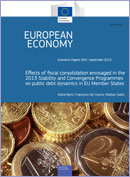|
|
|
|
|
|
 |
 |
 |
 |
Review mission to Portugal completed; programme remains broadly on track
Staff teams from the European Commission (EC), European Central Bank and International Monetary Fund (IMF) visited Lisbon from 16 September to 3 October for the combined eighth and ninth quarterly reviews of Portugal’s economic adjustment programme. The programme remains broadly on track, with the authorities determined to achieve its objectives. There are early signs of a recovery in economic activity, now projected to contract by 1.8 percent in 2013—an upward revision of 0.5 percentage points—before expanding by 0.8 percent in 2014. Unemployment is expected to remain below 18 percent next year and significant external adjustment is ongoing, with Portugal gaining export market share for the third year in a row. The 2013 fiscal deficit target of 5.5 percent of GDP is within reach and the authorities have reaffirmed their commitment to the 4 percent of GDP deficit target for 2014. Approval of the reviews would allow for the disbursement of €5.6 billion (€3.7 billion by the EU, and about €1.9 billion by the IMF). The next programme review is expected to take place in November 2013.
|
 |
 |
 |
|
 |
 |
 |
 |
 |
|
 |
 |
 |
| The programme is creating the conditions for sustainable public finances, balanced growth and more and better jobs for the Portuguese people. The European Commission will continue assisting Portugal with this ambitious agenda of reform. |
 |
Olli Rehn, Commission Vice-President responsible for Economic and Monetary Affairs and the Euro
|
|
|
|
 |
 |
 |
 |
Fourth review mission finds Spain’s financial assistance programme on track
A delegation from the European Commission, in liaison with the European Central Bank (ECB), the European Stability Mechanism (ESM) and the European Banking Authority (EBA) carried out the fourth review of the financial sector assistance programme for Spain from 16-27 September. The International Monetary Fund (IMF) also participated as an independent monitor. The mission concluded that the programme remains on track, and that Spanish financial markets have further stabilised. The liquidity situation and the financing structure of Spanish banks have further improved amid rising bank deposits and as Spanish banks regain access to funding markets. Although the restructuring of Spanish banks that have received state aid is well underway, weak demand for new lending and persisting fragmentation of EU banking markets still impinge on Spanish banks’ profitability prospects. The next review is scheduled for December 2013.
|
 |
|
 |
 |
|
 |
 |
 |
 |
Commission sets out to strengthen the social dimension of the Economic and Monetary Union (EMU)
The European Commission laid down its ideas for strengthening the social dimension of EMU in a Communication adopted on 2 October. The paper forms part of the Commission’s response to the debate on the deepening of the EMU, and follows the Commission’s blueprint on a deep and genuine EMU, published in November 2012. The Communication sees room for improvement in three areas, namely: reinforcing surveillance of employment and social challenges and strengthening policy coordination under the European Semester; enhancing solidarity and reinforcing job mobility; and strengthening social dialogue. The Communication will feed into discussion on the future of the EMU at the European Council from 24-25 October.
|
 |
|
 |
 |
|
 |
 |
 |
 |
Economic sentiment rises further in the euro area and the wider EU
The European Economic Sentiment Indicator (ESI) rose in September by 1.6 points in the euro area (to 96.9) and by 2.4 points in the EU (to 100.6). In the euro area, the current level is at its highest since August 2011, when it was 99.0. The strong increase in September resulted from markedly improved confidence across all business sectors, especially construction and retail. Sentiment improved in three of the five largest euro-area economies, namely in Spain (+2.5), Italy (+2.5) and France (+1.6), while sentiment was little changed in Germany (+0.3) and slightly worse in the Netherlands (-0.9). Sentiment in the financial services industry, which is not included in the ESI, increased sharply by 6.1 points to 11.3, driven by a striking increase in managers’ demand expectations, as well as improving assessments of past demand and the past business situation. The next Business and Consumer Survey results will be published on 30 October 2013.
|
 |
|
 |
 |
|
 |
 |
 |
 |
Industrial competitiveness of Member States still lagging despite some progress achieved
Two industrial competitiveness reports published by the European Commission show that while Member States have made some progress in improving the business climate, exports and sustainability, action is needed to keep industry in Europe. As a matter of priority, the report suggests making it as simple as possible for companies to carry out their daily business; cutting energy and raw materials costs; opening markets for European companies within the EU and globally; and improving the access of small and medium-sized enterprises (SMEs) to finance and capital markets. During a policy debate at the Competitiveness Council that took place from 26-27 September in Brussels, many delegations mentioned access to finance as one of the biggest challenges for SMEs.
|
 |
|
 |
 |
|
 |
 |
 |
 |
Commission to examine national restrictions on access to regulated professions
The European Commission is asking each Member State to report the list of professions it regulates, including those at regional level, which will later be published in the form of a European map showing which professions are regulated where. A regulated profession is one for which access is conditional upon the possession of a specific qualification or for which the use of a specific title is protected. Although Member States have the right to restrict access to certain professions, measures can be complex, burdensome and vary greatly from one Member State to another, discouraging workers from seeking and finding employment across borders. In a Communication adopted on 2 October, the Commission proposes a methodology and work plan for carrying out a mutual evaluation exercise with all Member States as foreseen in the revised Professional Qualifications Directive. The Directive is due to be formally adopted before the end of the year.
|
 |
|
 |
 |
|
 |
 |
 |
 |
Eurobarometer survey shows majority of EU citizens feel informed about the crisis despite decreased confidence in institutions
A special Eurobarometer "Internal market" survey published on 2 October found that more than half of EU citizens (54%) feel a least fairly well informed about the causes of the economic and financial crisis. At the same time, 64% said their confidence in national authorities has declined because of the crisis, and 63% say the same about the financial industry. European institutions scored somewhat better, but still a majority said that their confidence has decreased in European institutions (55%) and credit rating agencies (54%). Slightly fewer (41%) said they were less confident in European banks. The results confirm trends found in other recent Eurobarometer surveys funded by the Directorate-General for Economic and Financial Affairs examining citizens’ perceptions of the handling of the economic crisis. These surveys also affirmed stable support for the euro and citizens' support for reforms.
|
 |
|
 |
 |
|
 |
 |
 |
 |
August unemployment rates stabilised in the euro area and the EU
According to the latest Eurostat figures published on 1 October, the seasonally adjusted unemployment rate in the euro area (EA17) was 12.0% in August 2013, stable compared with July. The EU unemployment rate stood at 10.9%, also stable compared with July. Rates in both zones are higher when compared with August 2012, when they were 11.5% in the euro area and 10.6% in the EU. In August 2013, unemployment was 26.595 million in the EU, of which 19.178 million in the euro area. These figure are broadly unchanged compared with July 2013. Compared with August 2012, unemployment rose by 882,000 in the EU and by 895,000 in the euro area. Among EU Member States, the lowest unemployment rates were recorded in Austria (4.9%), Germany (5.2%) and Luxembourg (5.8%), and the highest in Greece (27.9% in June 2013) and Spain (26.2%). Compared with a year ago, the unemployment rate increased in 16 Member States, fell in 11 and remained stable in Poland.
|
 |
|
 |
 |
|
|
|
 |
 |
 |
 |
Effects of fiscal consolidation envisaged in the 2013 Stability and Convergence Programmes on public debt dynamics in EU Member States. European Economy. Economic Papers 504
This paper analyses the public debt-to-GDP ratio responses to fiscal consolidation efforts envisaged in the 2013 Stability and Convergence Programmes (SCPs) presented by EU Member States. In particular, the study focuses on the impact that different underlying assumptions on fiscal multipliers have on the projected dynamics of the public debt ratio. The authors show that large fiscal multipliers lead to temporary increases in the debt ratio, relative to a counterfactual (baseline) no-consolidation scenario. However, for high but plausible values of the multipliers, such counterintuitive effects are relatively short-lived. Based on the analysis, short-term increases in the debt ratio following consolidation could occur for countries expected to experience high fiscal multipliers, including Belgium, Cyprus, France, Greece, Italy, Ireland, Portugal, Slovenia and Spain.
|
|
 |
|
|
|
|
|
|
|
|
|
|
|
|
|
|
|
 |
| Directorate-General for Economic and Financial Affairs |
 |